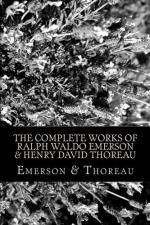|
This section contains 7,276 words (approx. 25 pages at 300 words per page) |

|
SOURCE: “Vision's Imperative: ‘Self-Reliance’ and the Command to See Things As They Are,” in Studies in Romanticism, Vol. 29, No. 4, Winter, 1990, pp. 555-70.
In the following essay, Jacobson explores Emerson's early theories on self-reliance, explaining that for Emerson, self-reliance leads to an emancipation of the will, allowing for a clearer understanding of the universe.
Emerson sets down the practical imperative of his early thought in the opening paragraph of “Self-Reliance” when he writes, “To believe your own thought, to believe that what is true for you in your private heart, is true for all men,—that is genius. Speak your latent conviction and it shall be the universal sense.”1 He describes a hyperbolic conception of freedom, freedom conceived as the unmediated expression of personal conviction unconstrained by regulations or rules. However, Emerson does not merely embrace the premise of pure expressivity; he goes on to assert in these lines...
|
This section contains 7,276 words (approx. 25 pages at 300 words per page) |

|


